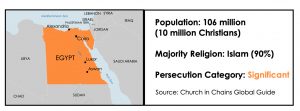
Egypt’s cities and agricultural activity are concentrated along the banks of the Nile and its delta, and the rest of the country is mostly desert. The economy depends on agriculture, tourism and cash remittances from Egyptians working abroad, mainly in Saudi Arabia and the Gulf. Cairo is Africa’s largest city, with about 7 million people (city) or 17 million (greater urban area).
Christians in Egypt
Christianity arrived in Egypt in the first century AD and it was a Christian country when Islam arrived in the seventh century, leading to centuries of discrimination and persecution. Egypt’s constitution identifies Islam as the state religion and the “principles of Sharia” as the primary source of legislation. It provides for freedom of belief but limits public practice of religion and establishment of places of worship to Christianity, Islam and Judaism, which are the only options on Egypt’s mandatory ID cards.
Christians now comprise around ten percent of the population, of whom over ninety percent belong to the Coptic Orthodox Church. Egypt’s Christian community is the largest in the Middle East and Christians have historically enjoyed freedom of worship provided that they do not evangelise Muslims. There has been growth in recent years in the number of Christians from a Muslim background and they can face ostracism, divorce and loss of employment.
Christians have enjoyed greater protection under President al-Sisi than under his predecessor President Morsi, but they continue to suffer sporadic Islamist attacks in rural Upper Egypt, where ultraconservative Salafist movements are active, and in the Sinai region where Islamic State terrorists operate.
A continuing problem for Christians, especially in Upper Egypt, is the occasional kidnapping of young women for forced conversion and marriage to Muslims; Christian men and women are also sometimes abducted for ransom. Families often lament that police fail to act when they report kidnappings.
Building Permits
For decades it was almost impossible for churches to obtain permission from the Egyptian government to construct new church buildings or repair existing ones. Building a mosque requires only a regular planning permit, but until recently building a church required a presidential permit and years of paperwork. Many Christians had no option but to meet for worship in unlicenced premises and were sometimes attacked by Muslim mobs that suspected them of using homes for church services.
On 30 August 2016 the Egyptian parliament passed the Law for Building and Restoring Churches, intended to make it quicker and easier to obtain permission to construct and repair church buildings and to make provision for legalising the status of Egypt’s approximately 5,000 unlicenced church buildings (including around 3,000 Coptic Orthodox churches). Some 3,730 churches applied for permits.
In October 2017, a cabinet committee met to start work on the legalisation of unlicenced churches and on 6 January 2018 the Ministry of Housing announced that Christians would be allowed to meet in unlicenced premises while registration applications are processed. Land began to be allocated for church buildings in new towns or developments and government permits began to be granted. When the authorities started making site visits to assess applications, however, extremist Muslims intent on ridding their villages of churches began to protest and attack local Christians.
On 8 January 2024 the committee approved the legalisation of a twenty-seventh batch of churches and affiliated service buildings, bringing the total approved for legalisation up to 3,160. Legalisation becomes final only when approved churches prove land ownership, comply with provisions of structural soundness and civil defence safety conditions and pay any required dues.
January Revolution 2011
President Hosni Mubarak resigned in February 2011, following the January Revolution, and in June 2011 Muslim Brotherhood candidate Mohammed Morsi won the presidential election. Christians hoped their situation would improve but extremist Muslims attacked their homes and businesses and set church buildings on fire – President Mubarak had banned extremist groups, but hundreds of Salafis returned to Egypt from abroad and some were released from prison.
On 30 June 2013, millions of protestors across Egypt, including many Christians, called for President Morsi to resign and the army ousted him on 3 July. When General al-Sisi announced the deposition on state television the Orthodox Pope Tawadros II appeared with him and within hours mobs of Morsi supporters began to attack Christians and their homes, businesses and church buildings.
On 14 August 2013 police and soldiers broke up two pro-Morsi camps in Cairo and hundreds died. In retaliation, radical Morsi supporters attacked churches and Christian homes all over Egypt, as well as police stations, hospitals and other properties. Some Muslims tried to protect Christians and their churches.
Egypt’s Defence Minister ordered the army to rebuild churches burned by protesters and some of Cairo’s biggest churches were given armed security. A new constitution, seen as more inclusive of Copts, was approved in January 2014 and General al-Sisi was elected President in May 2014.
(Assist News, BBC, Christian Solidarity Worldwide, Compass Direct News, Irish Times, Middle East Concern, Morning Star News, Sat-7, Telegraph, Watani, World Watch Monitor)
Church in Chains in Action
Church in Chains has been involved in supporting Christians in Egypt for over twenty years. Two fact-finding visits and constant monitoring of persecution incidents have led to a number of meetings with successive Egyptian Ambassadors to Ireland to discuss religious freedom issues.
In 2017, “Michael” (pseudonym used for security reasons), leader of a Christian ministry in Egypt spoke at Church in Chains’ annual conference in Dublin.
EGYPT: Over two hundred more church buildings legalised
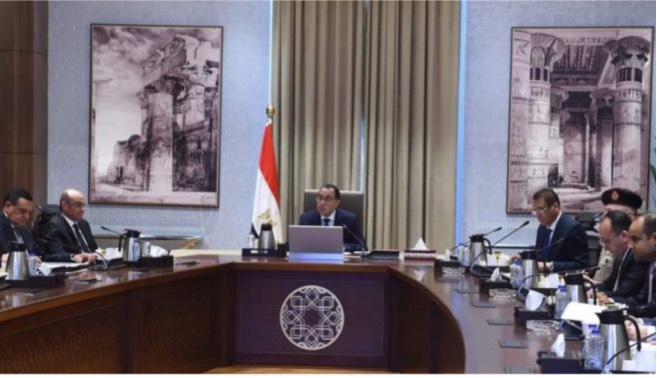
A new batch of 216 churches and affiliated service buildings has been granted legalisation
GLOBAL GUIDE LAUNCH: Over 200 million Christians at constant risk of persecution
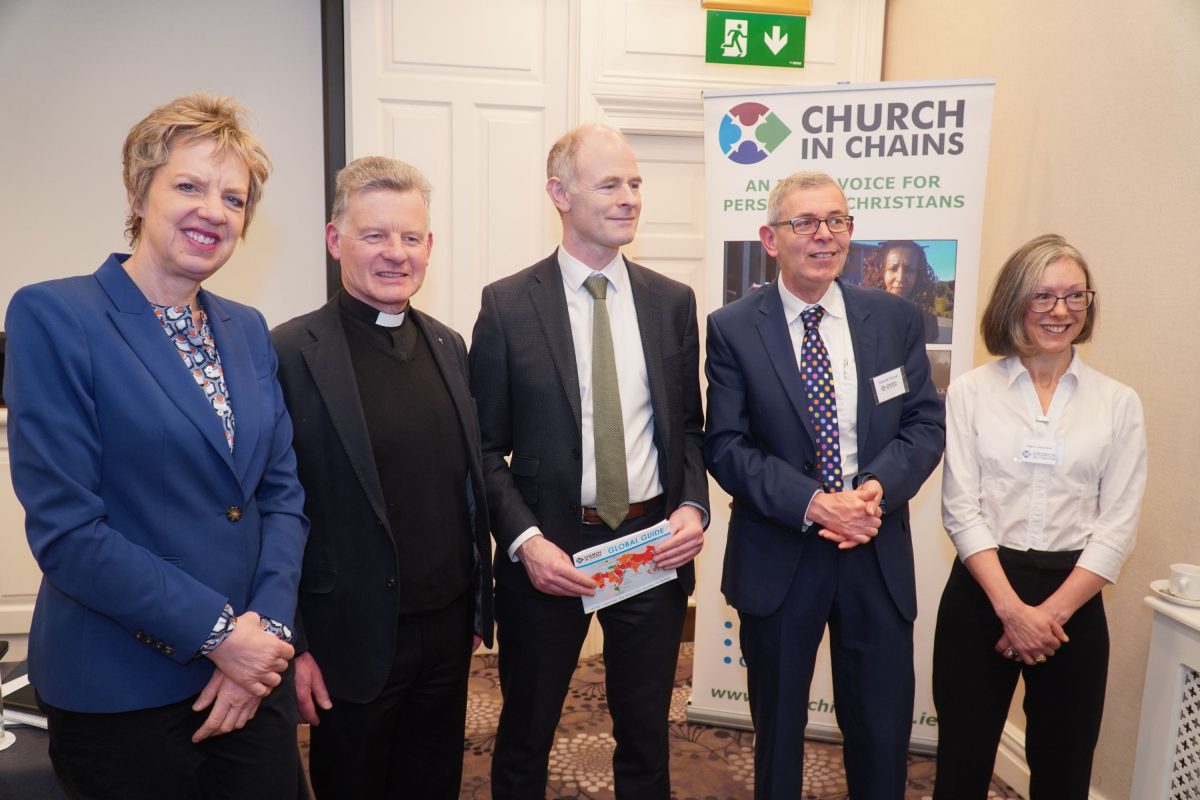
The Global Guide was formally launched by Rev Trevor Sargent (Church of Ireland minister and former Green Party leader).
EGYPT: 125 more church buildings approved
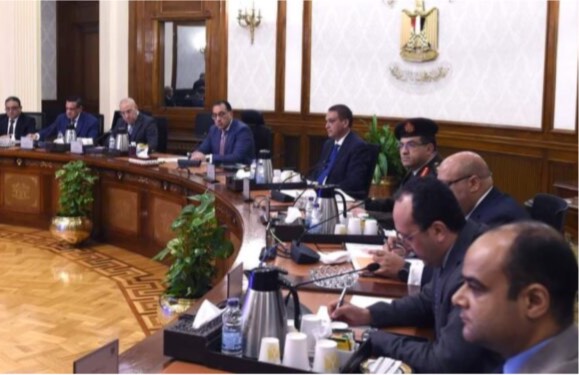
An Egyptian cabinet committee has legalised a new batch of 125 church buildings
EGYPT: Two Copts shot dead in Sinai
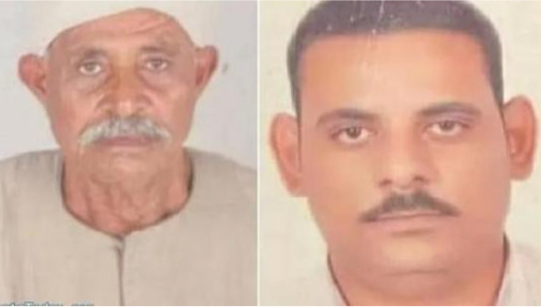
Islamic State militants have shot dead two Copts in Egypt’s Sinai region
